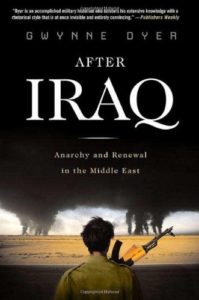Gwynne Dyer

Published in Canada and Australia as: The Mess They Made: The Middle East after Iraq
‘For chapter two alone, Dyer’s book is worth the money. There is much more – on relations between the United States and Iran, on the Shia populations in other Arab countries, and on Israel’s dilemma as it no longer monopolises US interests in the Middle East. Dyer writes with easy fluency, with gentle, teasing wit, and with an intelligent balance between the populist and academic that makes his argument all the more persuasive.’ Irish Times
‘Gwynne Dyer’s After Iraq goes beyond the immediate circumstances, assumes that the American occupation will not last, and then asks what is the future for the Middle East. His answer, in essence, is that the region is best left to itself and any belief that Western states can determine its future is doomed to failure. Even the Islamist radicalisation may not survive – while much of it may be a reaction to the rule of local elites, the movement has been aided by external interference. Dyer is most pessimistic in his assessment of Israel’s precarious position, doubting whether current US support will persist. He is also dubious about the military significance of the region’s oil reserves, arguing that whoever rules the countries of the Persian Gulf will still have to sell their oil. Both views are open to question – the Israel lobby has got a considerable boost from the growing influence of Christian Zionism in the US, and there is a 35-year history of US military interest in Gulf oil. Even so, Dyer writes with a racy style and provokes as much as he informs. He leaves one amazed at the sheer incompetence of the American and British governments of recent years.’ The Independent
‘The message this world-renowned political observer offers is frightening. While everyone is aware of the insurgency the US invasion of Iraq provoked, most have not seen a whole lot of analysis about how the political landscape will change – after the fact. For Dyer’s money, change it will throughout the whole Middle East “and we may not like it when it does”. It will also, the popular journalist-broadcaster warns, shake all major players to the core. If you read no other analysis, read Dyer’s.’ Ottawa Citizen
‘Most commentators on the war in Iraq (from both sides of the conflict) fail to put the events in a historical context, and those that do tend to offer a skewed (self-serving) version of that history. Dyer goes one better. Not only does he place current events in a balanced and historical context, he also examines their significance in terms of the future … Another reason why Dyer’s books are worth reading is because they offer a clear and simple analysis of events, but without being reductive.’ Courier Mail, Australia
‘The principal attraction of Dyer’s geopolitical punditry has always been its trenchant tone and clear-eyed, non-partisan approach. Though he is firmly on the side of those who believe that big countries should stop doing terrible things to small ones… Dyer tends to take the long view of regional conflicts… tough-love analyses such as Dyer’s are so necessary.’ Nathan Whitlock Toronto Star (Canada)
‘Dyer knows how to highlight the absurdities of dumb or hypocritical policies.’ Globe & Mail Ontario (Canada)
‘Dyer will open even well-informed readers’ eyes as he looks ahead to what will happen once American troops dust the soil of Iraq from their boots.’ Hill Times Ottawa (Canada)
‘Dyer’s book is important because it’s one of the few books on the topic I’ve read (and I’ve read a lot) to really make the effort to place the current conflicts in their long term historical perspective, and to speculate on a future beyond the immediate political and strategic context.’ Larvatus Prodeo (Australian socio-political discussion/blog)
‘Dyer’s intelligent insight and historical perspective offer a valuable contribution for those seeking to understand the complex Middle East.’ Sun Herald (Australia)
‘AFTER IRAQ BY GWYNNE DYER (Yale, £16.99) After Iraq, it’s pretty much the deluge, as far as the Middle East is concerned – and US hegemony, if this book is to be believed. And it’s hardly short on credibility: this is no diatribe but a calm and masterful analysis, albeit one with a certain journalistic style and polemical edge. Some familiar ground is covered: no matter, the sheer unmitigated folly of the Iraqi escapade has seldom been spelled out quite so clearly or as damningly as it is here. The book looks forward too, unpacking the issues at stake in Iran and in the Gulf, and what the coming years could have in store for Israel.’ Scotsman
‘Dyer’s analysis of the Middle East crisis is both cogent and compelling. He discusses how Britain and the US have become embroiled in an unwinnable situation in Iraq, and looks ahead to what is likely to happen when Western troops pull out. What follows is conjecture, but it is well argued and Dyer offers precedents to support what he says. If he is right, we must prepare for a climactic shift of power and an upheaval that makes the present troubles seem almost trivial. Dyer writes in a lucid, conversational way that adds an awful credibility to his forecasts.’ Good Book Guide
Sales
- McClelland & Stewart Canada
- Scribe Australia
- Thomas Dunne (SMP) USA
- Yale University Press UK
- Arab Scientific Publishers Lebanon
- Campus Verlag Germany
Material: finished copies of UK and US editions (267pp)